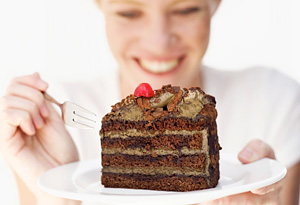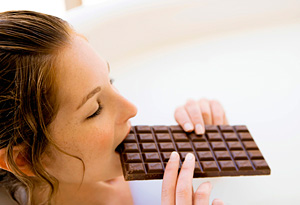Having What You Want

Photo: Stockbyte/Thinkstock
When you have a craving for a food you love, do you think you have to eat it all or just not eat it all? Would you be satisfied with just a taste? Women, Food and God author Geneen Roth explains why you don't have to give up anything if you just understand why you're eating it and savor it, bite by bite.
My husband, Matt, returned from a business trip last week and asked me this question: If you had to give up either hot water or sex, which would it be? Matt teaches company executives about the value of laughter and play, and I trust him completely, but still. Hot water or sex? "Tell me about your business trip," I said nonchalantly. He laughed. "Just answer the question."
"Could we still kiss? Hug?" I asked. He nodded his head yes. "Now, answer the question."
"Sex," I said after a few long minutes.
"Okay," he said, "here's the next question. If you had to give up either hot water or laughter, what would you choose?" "Hot water," I said. "Without laughter, the rest wouldn't mean very much."
As I pondered the choices, I asked myself what I would have chosen if he'd asked me about giving up chocolate. I believe in laughter, I really do, but I also believe in chocolate. I've gone without hot water, sex and laughter, but in the past 15 years, I can't remember going without chocolate for more than 24 hours. Chocolate makes me happy to be alive. Every day, after lunch, I have one piece of 77 percent bittersweet chocolate.
One piece, that's all.
One piece fills the mouth, saturates the taste buds, evokes heaven on earth. During my years of dieting and binging, I never thought I could eat one piece of anything. It was either the whole box or nothing at all. I was afraid of food. I was afraid to give myself what I loved.
As I've worked with people over the past couple of decades, I've discovered that most feel the same way as I did. They don't believe it's possible to eat just one piece of anything they love. They believe that once they start, they will never stop. They think they need control and willpower to stop emotional eating, which means depriving themselves of foods they love. I understand why, given our past experiences of eating like starving dogs, deprivation seems like the only wise choice. However, I want to suggest a new way to eat foods you love: Consider taking one piece. One bite. One chunk.
Most of the time, we are so busy wanting the next thing, the piece that we don't have, that we don't allow ourselves to enjoy the one that's in our mouth. When we are busy focusing on what we don't have, we don't pay attention to what we do have.
Wanting is different from having. Wanting is in the future. It is based on an idea of what might make you happy in five minutes, tomorrow, next week. But having is here, now. Most of us don't let ourselves have what's in front of us, so we're always wanting more. When you don't let yourself have what you already have, you are always hungry, always searching, always restless.
How to savor your food

Photo: Stockbyte/Thinkstock
Think about the last time you ate something you really wanted. Where was your attention after you took the first bite? Was it on the next bite? Did you start thinking about all the things you had to do that day or what your best friend said to you about her hair? Did you immediately think, "Oh, this tastes so good, one piece will not be enough, I want more"? Did you feel so guilty about having what you wanted that you couldn't let yourself actually savor it?
At my weekend retreats, we eat lunch together. At the last lunch, I bring in a flourless chocolate cake. Before anyone eats the cake, I ask them to look at it and be aware of how they feel. Some people realize they are full and don't want to eat dessert. Some don't like chocolate (they are missing a gene, I am certain). And some start worrying about getting enough before they take even one bite.
Then I ask those who want a piece of the cake to take it. To notice how it feels to cut a slice, put it on their plates, walk back to their seats. Before they eat it, I ask them to breathe a few times. (Breathing helps. It always helps. It allows you to stop the automatic hand-to-mouth momentum. It allows you a few seconds of being present instead of racing around in your head and telling yourself that you shouldn't be doing what you are doing. That you don't deserve this bite, this piece, this pleasure.)
Finally, I ask everyone to scoop a bite of the cake onto their fork and move it to their mouth. One bite. Then I ask them to really, truly allow themselves to taste the whole range of sensations that are in one bite. The way the chocolate explodes on their tongue, the way it feels on the sides of their mouth. How the taste changes from moment to moment, what it feels like in their throat, the lingering taste of it after they've swallowed.
We eat each bite slowly, as if heaven existed right here, right now, and we deserved to experience it.
Why you should have what you love
At my weekend retreats, we eat lunch together. At the last lunch, I bring in a flourless chocolate cake. Before anyone eats the cake, I ask them to look at it and be aware of how they feel. Some people realize they are full and don't want to eat dessert. Some don't like chocolate (they are missing a gene, I am certain). And some start worrying about getting enough before they take even one bite.
Then I ask those who want a piece of the cake to take it. To notice how it feels to cut a slice, put it on their plates, walk back to their seats. Before they eat it, I ask them to breathe a few times. (Breathing helps. It always helps. It allows you to stop the automatic hand-to-mouth momentum. It allows you a few seconds of being present instead of racing around in your head and telling yourself that you shouldn't be doing what you are doing. That you don't deserve this bite, this piece, this pleasure.)
Finally, I ask everyone to scoop a bite of the cake onto their fork and move it to their mouth. One bite. Then I ask them to really, truly allow themselves to taste the whole range of sensations that are in one bite. The way the chocolate explodes on their tongue, the way it feels on the sides of their mouth. How the taste changes from moment to moment, what it feels like in their throat, the lingering taste of it after they've swallowed.
We eat each bite slowly, as if heaven existed right here, right now, and we deserved to experience it.
Why you should have what you love

Photo: Jupiterimages/Pixland/Thinkstock
So, here's my suggestion: Let yourself have what you love. One piece of it, one little bit of it, each day. You need to start small so you don't overwhelm yourself. If you like chips, take one and sit down by yourself for three minutes. Smell it. Hold it up to the light. Rub it on your lips. Then take a small bite of the chip and notice how it tastes. You might discover that it's the salt you want and not the rest of it. Or the crunch and not the salt. After you swallow, ask yourself if you want another bite. Be truthful with yourself. Notice if, when you ate that one bite, you were already thinking about the next one...and the next. Notice if, even as you read these words, you are saying to yourself, "I can't be satisfied with just one little bite." How do you know until you try?
All any of us ever want is to feel wonder, pleasure, peace and contentment, but the way we go about it—by depriving ourselves of what we love—sabotages our deepest longing. This much I promise you: Your world will be a better place when you realize you can have what you love without gaining 1,000 pounds. When you allow yourself to have what you love, you realize you are someone upon whom love can be lavished.
And if anyone happens to ask you to choose either laughter or chocolate, tell them that you'll take both.
Geneen Roth's books were among the first to link compulsive eating and perpetual dieting with deeply personal and spiritual issues that go far beyond food, weight and body image. She believes that we eat the way we live and that our relationships to food, money and love are exact reflections of our deeply held beliefs about ourselves and the amount of joy, abundance, pain and scarcity we believe we have (or are allowed) to have in our lives.
Roth has appeared on many national television shows, including The Oprah Winfrey Show, 20/20, The NBC Nightly News, The View and Good Morning America. Articles about Roth and her work have appeared in numerous publications, including O, The Oprah Magazine, Cosmopolitan, Time, Elle, The New York Times, The Chicago Tribune and The Philadelphia Inquirer. She has written a monthly column in Good Housekeeping magazine since 2007. Roth is the author of eight books, including The New York Times best-seller When Food Is Love and a memoir about love and loss, The Craggy Hole in My Heart. Women, Food and God: An Unexpected Path to Almost Everything is her newest book.
Read More from Geneen Roth:
How to respond to your cravings
Free yourself from food addiction
Get clear about Geneen's 7 food guidelines
All any of us ever want is to feel wonder, pleasure, peace and contentment, but the way we go about it—by depriving ourselves of what we love—sabotages our deepest longing. This much I promise you: Your world will be a better place when you realize you can have what you love without gaining 1,000 pounds. When you allow yourself to have what you love, you realize you are someone upon whom love can be lavished.
And if anyone happens to ask you to choose either laughter or chocolate, tell them that you'll take both.
Geneen Roth's books were among the first to link compulsive eating and perpetual dieting with deeply personal and spiritual issues that go far beyond food, weight and body image. She believes that we eat the way we live and that our relationships to food, money and love are exact reflections of our deeply held beliefs about ourselves and the amount of joy, abundance, pain and scarcity we believe we have (or are allowed) to have in our lives.
Roth has appeared on many national television shows, including The Oprah Winfrey Show, 20/20, The NBC Nightly News, The View and Good Morning America. Articles about Roth and her work have appeared in numerous publications, including O, The Oprah Magazine, Cosmopolitan, Time, Elle, The New York Times, The Chicago Tribune and The Philadelphia Inquirer. She has written a monthly column in Good Housekeeping magazine since 2007. Roth is the author of eight books, including The New York Times best-seller When Food Is Love and a memoir about love and loss, The Craggy Hole in My Heart. Women, Food and God: An Unexpected Path to Almost Everything is her newest book.
Read More from Geneen Roth:
How to respond to your cravings
Free yourself from food addiction
Get clear about Geneen's 7 food guidelines



